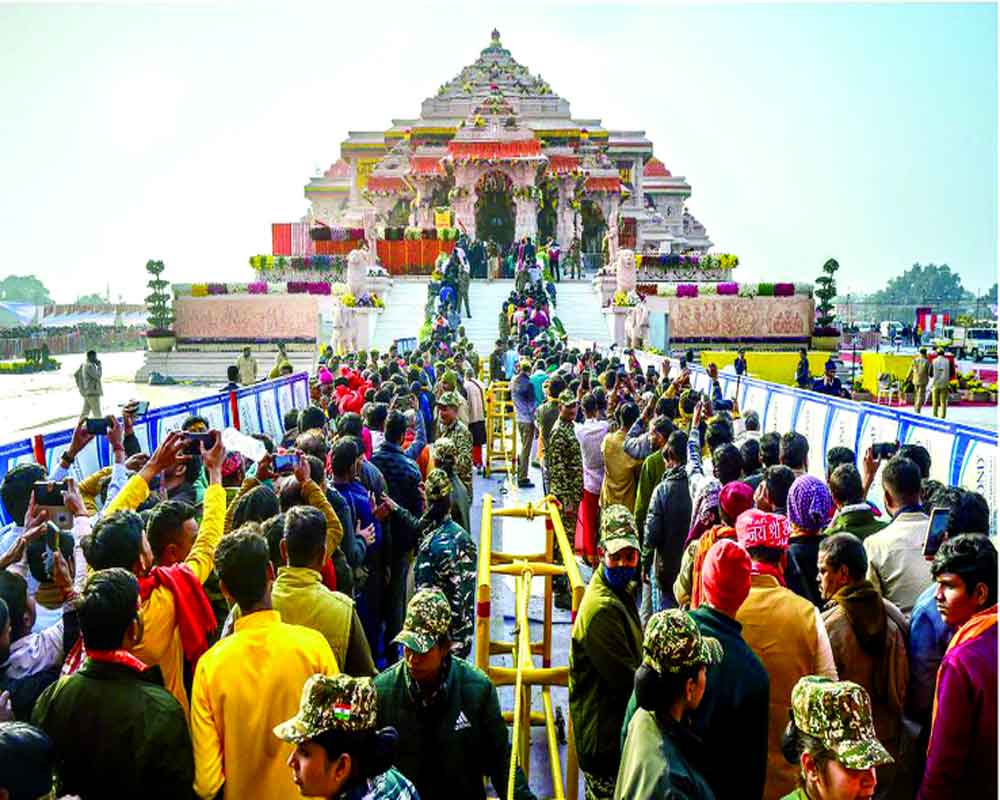Lord Ram is not exclusive to Hindus, He is for everyone; anyone with a soft spot for life, fair play and kindness could be drawn to His life lessons
While consecrating Shri Ram Lalla in Ayodhya on January 22, several speakers, especially the Prime Minister, emphasised that Lord Ram is not exclusively for Hindus, but for everyone. He is worshipped in many countries, including Islamic ones like Indonesia and Malaysia. Anyone who has a soft spot for living life, fair play and kindness to all, friend or foe will be drawn by Lord Rama. People outside India enduring wars and suffering may get attracted to Hinduism. There is much that the faith offers to humans in search of spirituality.
The source of the Abrahamic religions is Prophet Abraham who lived and preached about 4,000 years ago. He began life in Mesopotamia (Iraq), and all probability, had to shift to Canaan (today’s Israel). With the experience gained over 700 years, Prophet Moses delivered his Ten Commandments on Mount Sinai. The Third Commandment says, “Thou shalt not take the name of thy Lord in vain”. There shall also not be any reproduction, imaginary or otherwise, of a picture or profile of God: nor can any worshipper hope to meet God or even have a glimpse.
The Jews have obeyed Moses faithfully; Christians, more or less, while the Muslims have followed him strictly and scrupulously. When the Christians (and later Muslims) came to India, they reacted as preached by St. Thomas. The Muslims justified the demolition of Hindu temples by citing idolatry as the main reason. As a result of this conviction, Abrahamic religions have denied themselves the opportunity to experience any spirituality, which is largely associated with either meeting divinity or having a glimpse of a profile of God.
On the other hand, Hindu tradition has encouraged the worshipper to come as near as possible to divinity. When Swami Vivekananda met Shri Ramakrishna Paramahansa, he asked the latter whether he could enable him to get a view of the divine. When Paramahansa replied yes, possibly, Vivekananda became his disciple. Ramakrishna is reported to have enabled Vivekananda to have a view of the divine once or twice. Much later and separately at Pondicherry, Maharshi Aurobindo is also reported to have experienced the sight of the divine. Many sages too spoke of such spiritual experiences. For the rest, committed Hindus have to remain satisfied with puja and the sight of the pratima or more occasionally for as long as they like. Some devotees even report that for a moment or two the pratima smiled or even blessed the worshipper.
When I was five years old in 1942, I travelled with my parents to Palitana (Gujarat). We stayed with the family of a medical doctor, Pandya, for four days. Mrs. Pandya did puja every evening at sunset. On the third evening, a few minutes into the puja the lady began levitating up to three feet and then again doing the same thing for about ten minutes. I have not forgotten those scenes in my life. I was explained this phenomenon by my father years later, as an incident of spirituality. During the same trip, we stopped at Dwaraka and went to the main temple for darshan. There my mother exhorted me to fold my hands and turn my head. Instantly, I told my mother that Krishna was smiling at me. Growing up, I dismissed this as my imagination.
Over and about this, there is colour, music dancing and gay abandon, not to forget jewellery. If that is not enough, there are also flowers as well as prasad, mostly sweets and delicacies. Other faiths have not encouraged gaieties, much less liberties. Even our puja can be fun-filled and not as sombre as a Western prayer. There are colours of Holi festivities, yellows at Basant Panchami and multi-coloured kites flying in the sky, the lights at Diwali and also multi-coloured rangolis.
The distinguishing feature is the application of deductive logic which says there is only one God, which is mine; there is none other. The common folk may readily accept what the cleric says and the Holy Book prescribes. But with the progress of education and enlightenment, a person is most likely to question the given premise not backed up by evidence. After all, no Prophet had a universal survey conducted before pronouncing this premise.
In contrast, Hinduism has no authoritative holy book that holds the supreme steering wheel for its followers. The faith implicitly expects every follower to choose his dharma or mission in life; if one cannot choose or decide, one’s caste is the guide. Thereafter, the person’s karma moulds his fate, which is a scientific principle. For every action in nature, there is an opposite reaction.
Each believer is free to choose a version of the divine he prefers. There are believers, worshippers and agnostics. The seeker is free to opt for spirituality to attain the divine. This is the reason the West, whether Europe or America, is welcoming temples, the most recent one being an imposing one in New Jersey in the US, the next one being in Abu Dhabi in the UAE. A temple is the residence of God because it is a place for attaining spirituality, while Abrahamic places of worship are only prayer halls and can be shifted or sold.
(The writer is a well-known columnist, an author and a former member of the Rajya Sabha. The views expressed are personal)


























